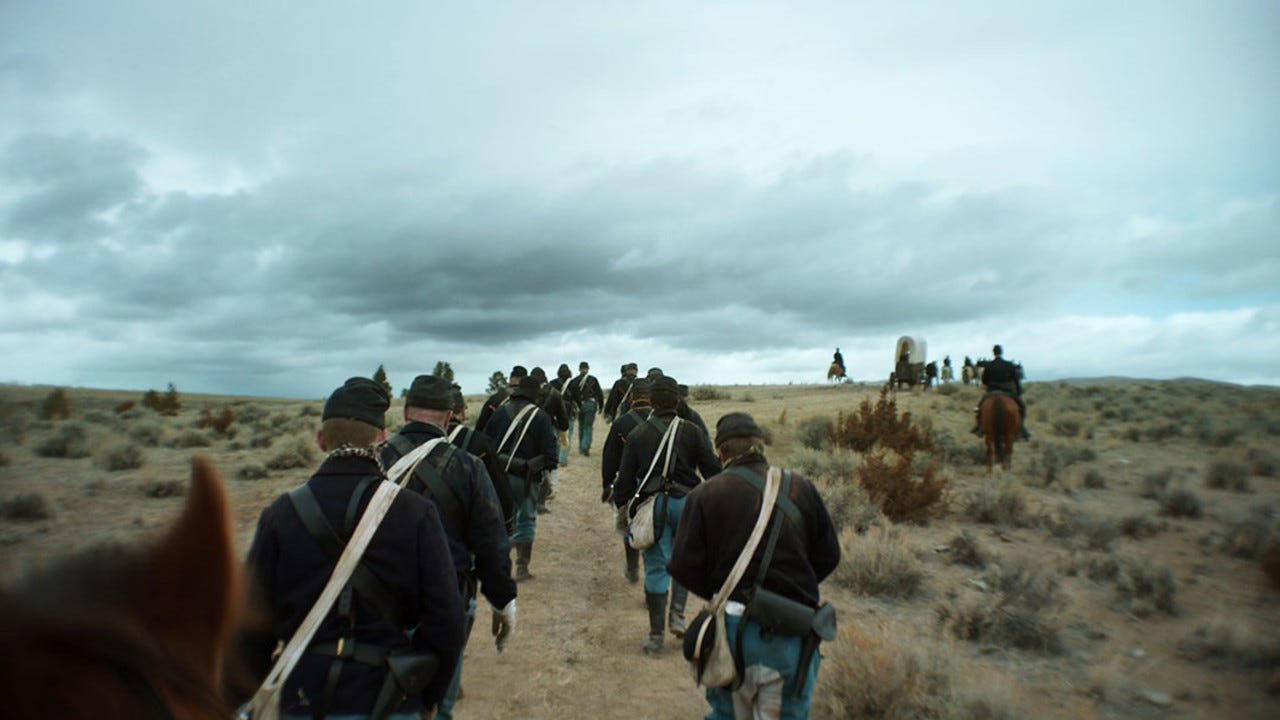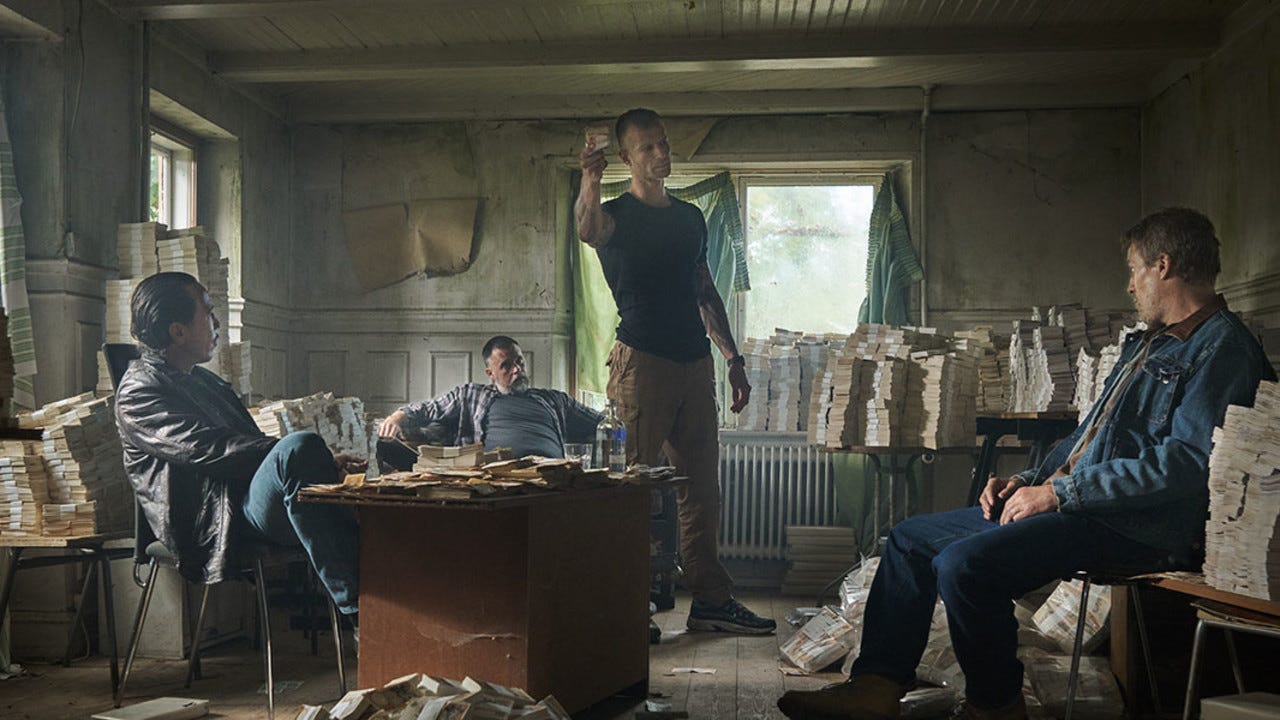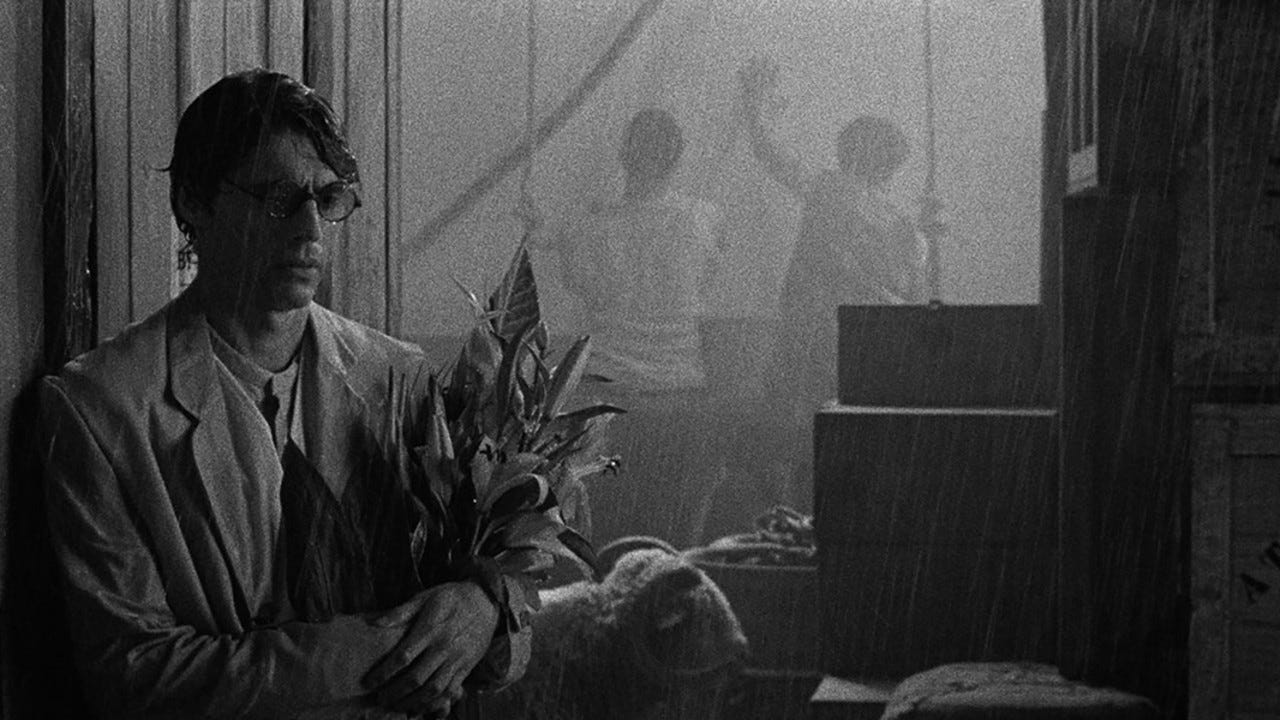TIFF '24 Day Three
A few words about feeling rested and not knowing limits
So I thought Day One was going to be my craziest. Six films, right off the bat. I thought wrong. On Saturday, I woke up feeling unusually well rested, even for my normal daily life. I got up, showered, wrote my dispatch, and then rode on down to what would end up my first of seven screenings that day. Seven. There’s something very wrong with me. I think if I was being a bit more social this festival, I’d be finding friends to hang out with during wide gaps between movies, but the truth is, while it’s been fun seeing friends at screenings and the like, I’ve felt a stronger pull, in these first days at least, toward the more solitary experience of watching a movie, even if it’s surrounded by a few hundred other people. So when I noticed some big gaps on Saturday, I pored over the schedule and I filled them with more movies. Seven. Christ.
The first of those was Roberto Minervini’s The Damned, a fiction feature from the great documentary filmmaker, about a troop of Union soldiers sent out west during the Civil War to scout and protect the land from Confederates attempting to sieze control of American western expansion. Shot in Montana, with a cast of what amount to reenactors, the film works as something of an answer to Civil War reenactment, avoiding the spectacle of big battles (though there is some terrific, terrifying gunfighting), and instead drilling down into the world of the menial soldier. It’s a portrait of war as a meeting of people, some only young teenagers, in the worst possible circumstances. It tests their beliefs, their worldviews, their care for others and themselves, and exposes the profound loneliness of dying. The movie was kind of a perfect start to the morning. Grim, but also tender and moving, and calm enough most of the time.
Next, I went to see Hard Truths, the new film from the great Mike Leigh, reunited with Secrets & Lies star Marianne Jean-Baptiste. I knew nothing about the film going in, other than that it was very funny and also would rip my heart out, as many of Leigh’s films do. I laughed a lot, and then my heart was, indeed, torn right out. Jean-Baptiste plays Pansy, a woman whose every utterance is a blistering, angry, often hilariously phrased rant, sometimes to nobody in particular, but more often to and at the people around her. She’s also a clean freak. But it’s not just that. She’s afraid. Of everything. The outside. Germs. Bugs. Plants. The only thing she doesn’t seem afraid of is people, who she mercilessly attacks at every opportunity, until we realize she’s terrified of them, too. The slow revelation of the depths of Pansy’s emotional damage and mental health struggle is unbelievably heartbreaking, compounded by watching her family, including her sister, but particularly her husband and 22-year-old son, living under the weight of what must be a lifetime of dealing her. Her barbed attitude has rendered her husdand and son silent, unable to confront the problem, to help her, to help themselves. A truly incredible portrait of a woman what can’t take the world, and perhaps the highlight of the festival so far. Hard to top Leigh when he’s operating at the top of his game, and Jean-Baptiste, as always a marvel, though I’d like to make special mention of David Webber, who plays her husband Curtley, and Tuwaine Barrett, playing her son Moses. Both delivering nearly silent performances whose complexity and sorrow exists beyond words.
Anything after that was liable to be a come down, but here I had a gap, and I filled it with Mother Mother, directed by Somali-Canadian musician K’naan Warsame. A surprising name, but the bigger surprise was that he movie was very good. I cannot lie. We’re not talking Mike Leigh good here. But this story of a Somali camel herder whose teenage son is killed in an altercation with a second-generation Somali-American teenager on vacation was surprisingly affecting in small, intelligent ways. After her son is killed, rather than sentence the other boy to death, she asks to adopt him, to have him live with her, raising camels. The plot goes in expected directions, but always pitched at an intimate, human level, exploring motherhood, forgiveness, acceptance, and also the difficult dynamics of diaspora. Turns out Warsame is a filmmaker to keep an eye on.
After that was Wavelengths 2. After the first short programme delighted me, this second one was sort of a disappointment. No need to talk about short, experimental films I didn’t care for, though I’ll highlight two I liked. Leonardo Pirondi’s Adrift Potentials, made from old found footage from an unfinished ‘70s film by Brazilians in exile from the dictatorship of the time, was a fascinating watch. Then Chris Kennedy’s Go Between, featuring shots of a bridge from between the slits of window blinds, seen first only in strips, and then in total via multiple exposures. That one in particular got me. Not much to it, but it was beautiful to see the images emerge. Also of note at the screening was the introduction by the filmmakers, who took a stand and called for TIFF to drop sponsor RBC for their funding and complicity in Palestinian genocide, which unlike the words of protesters at TIFF’s opening night gala, was met with a hearty round of applause. A very different crowd at Wavelengths.
I followed all that experimentation by going in the completely opposite direction, toward straightforward genre in Frederik Louis Hviid’s The Quiet Ones, about the biggest robbery in Danish history, in 2008. Not only inspired by the real story, it was written in collaboration with one of the perpetrators of the crime, who was caught and has since been released. The movie is kind of an ideal procedural heist, though the reality of it adds an interesting flavour. Where heist movies usually get their juice from the clever details of planning (and there’s some of that here), the most interesting thing is the brute force of it all, almost reminiscent of a heist in a Christopher Nolan film like Tenet. You tell me Scandinavian procedural heist thriller and I’m in. Extremely my shit.
Then there was Grand Tour, the new film from Miguel Gomes. The story is set in 1917, about a British diplomat going from city to city across countries all over Asia, on the run from his long-time fiancée, who wants to be married. It’s a hilarious setup, and the movie looks amazing. Shot on film, mostly in black-and-white, but with lighting reminiscent of much older cinema. It’s also a hybrid documentary of sorts. While the characters of the film are presented in constructed, period scenes. The details of the diplomats travels are narrated over modern footage of the places he visits, turning it into something of a beautiful, hypnotic travelogue. Another highlight of the festival.
Unfortunately, I closed out my day with a lowlight. And I regreted it, not just because it was my seventh screening, but because it was at midnight, meaning I wasn’t going to be sleeping much. Joseph Khan is back with his new film Ick, a high school monster movie comedy starring Brandon Routh and a soundtrack of ‘00s pop punk. The pop punk was appreciated, and some of it made me laugh, but overall, just a dud, with Khan and his co-writers shoving in every topical reference they could, from wokeness to COVID, and it mostly doesn’t land. Ah well. Life is full of mistakes and regrets. A theme of the movie, funny enough.









Joseph Kahn! I'll line up for his misfires any day.
"Hard Truths" sounds a lot like Mike Leigh's typical great movies, except with a Black lead. It's always interesting to see how critics and distributors treat traditionally-indie films and storylines when there's a minority in the lead. I really do think if someone made a "Boyhood" with a Hispanic kid, it would be completely ignored. And I see "Hard Truths" was somehow rejected from a few fests, which seems unusual from Mike Leigh.
I know Venice rejected it, but they’re weird. The reception in Toronto has been uniformly excellent.